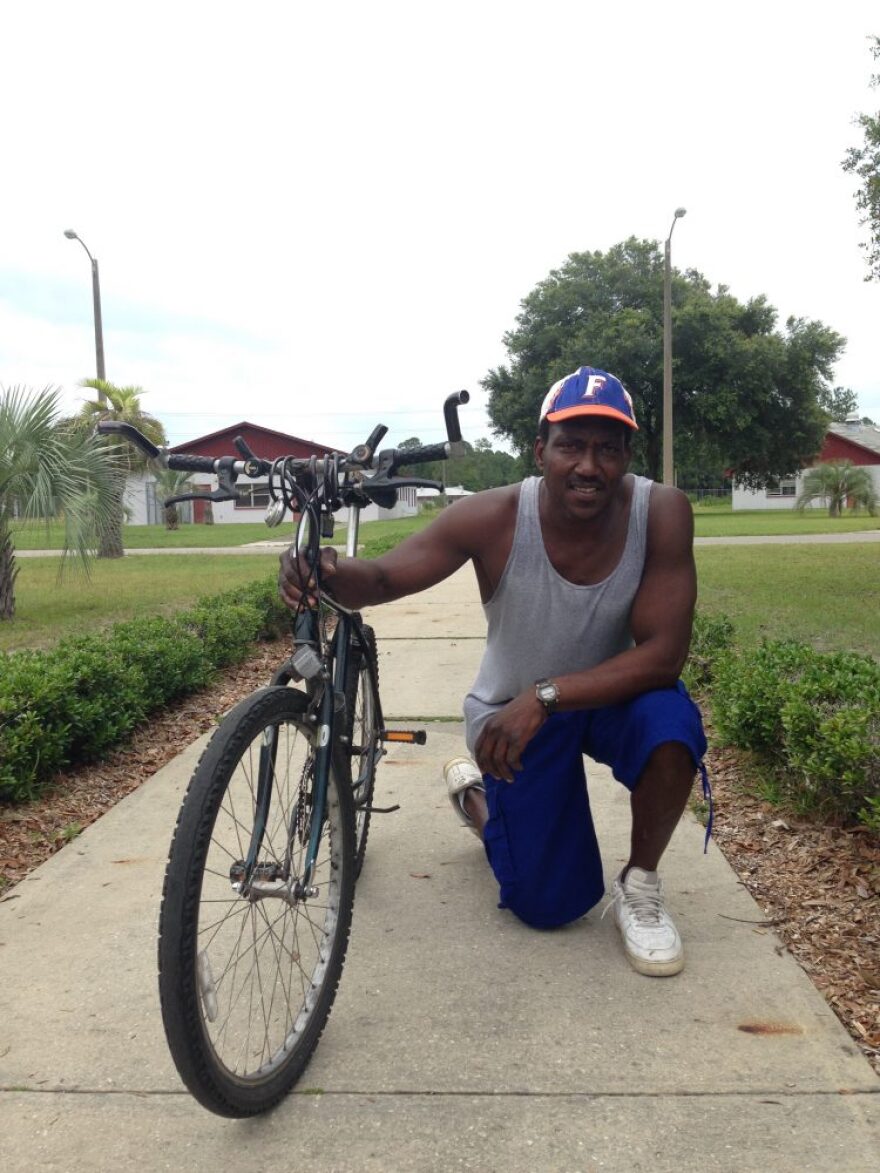Shane Hartley, 25, rides his Bianchi all-road to make deliveries for his job. He believes his bike is a better investment than a car and chooses to live his life on it.
Troy Butler, 49, built his bike from used parts he found around GRACE Marketplace and other places. As he bikes to work, he drags in one hand a large wagon, which holds lawn equipment for his lawn service job.
Advocacy groups in Gainesville have debated a larger integration of bikes in community in venues like the meetings held by Gainesville Citizens for Active Transportation. A bike-sharing program has been discussed as a solution to issues surrounding transportation around the city.
Gainesville has many elements that make for a city that can integrate bike transportation– a strong bike community, relatively small distances and a range of residents who would benefit from the program.
While the city is slowly putting new bike lanes into place, like the new lanes on 8th Avenue and NW 34th Street, a bike-sharing program would be an official transportation system that allows citizens access to bikes at convenient locations.
Starting A Trend
A bike-sharing program is a city-run program that is usually a blended public- and privately-funded extension of a city's public transportation system. Users can place credit card information in the system and ride a bike for 30-minute intervals to travel short distances normally under three miles.
“It’s public infrastructure in the form of bikes,” said Kristen Young, vice president of Gainesville Citizens for Active Transportation, “It would be an extension to the already existing model of RTS.”
About 33 universities have their own bike-sharing systems in place.
Ron Cunningham, executive director of Bike Florida, said at a GCAT meeting that each bike in the program can cost anywhere from $3,000 to $5,000 to put in place.
“When the bike share concept started in 2010, it cost $6,000 per bike,” Cunningham said. “Now it’s $3,000 to $5,000 per bike.”
City Commissioner Randy Wells suggested placing the bikes at the University of Florida, Innovation Square, RTS Transit Center, downtown and Santa Fe College. Several of these areas were previously chosen for the first attempt at a bike-share system in Gainesville.
In 1999, Gainesville tried to grow a bike-sharing program. The idea was to use the bike and leave it for the next person. It lasted about two months until the bikes all disappeared.
But renewed interest in a bike program came from an agenda raised at a city commission meeting last month where employees expressed their desire for another mode of transportation, according to Wells.
Access Matters
Employees, students and other higher-income residents are the targets for this program. However, one huge issue with this is giving all Gainesville residents a chance to access the bikes.
“You're further pushing an already neglected community by putting them only at the university, at Innovation Square," said Patrick Dodds, vice president of The Freewheel Project. "You're not really dealing with the issues that exist with the infrastructure at the time… So you distance yourselves from them more.”
Dodds said his organization found that residents who have lower incomes rely on bikes as their transportation when the bus is not affordable or efficient for them.
“A bus trip to the mall - you got to get on three different buses and it’s gonna take about two hours,” Butler said. “If I get on my bike I’ll be there in 30 to 40 minutes.”
Why Bikes?
Hartley said his bike riding is a lifestyle choice and a whole mentality.
“It’s my belief that I can go my life without a car. It’s like a lifestyle choice,” he said. “Financially, environmentally, it’s like a health thing. It’s everything. It’s the simplicity.”
Yet, according to Dodds, the possible negative connotations of bicycling is another obstacle to providing pubic bikes to the community.
“That’s what we really need to work on. It’s that people think it’s a product of their circumstance rather than a choice they have to make,” Dodds said, “If you go to the east side, they hate their bike. Their bike is like a symbol for what they don’t have. It’s they don’t have a car; they have to ride this bike.”
Open Possibilities
Young remained with a hopeful enthusiasm that a bike-sharing program could be specifically tailored to meet the needs of a place as diverse as Gainesville.
“It’s a very malleable program. It's not one thing or the other,” Young said. “And so in order to get it to be a Gainesville program, we need to have people all over Gainesville to be involved.”

